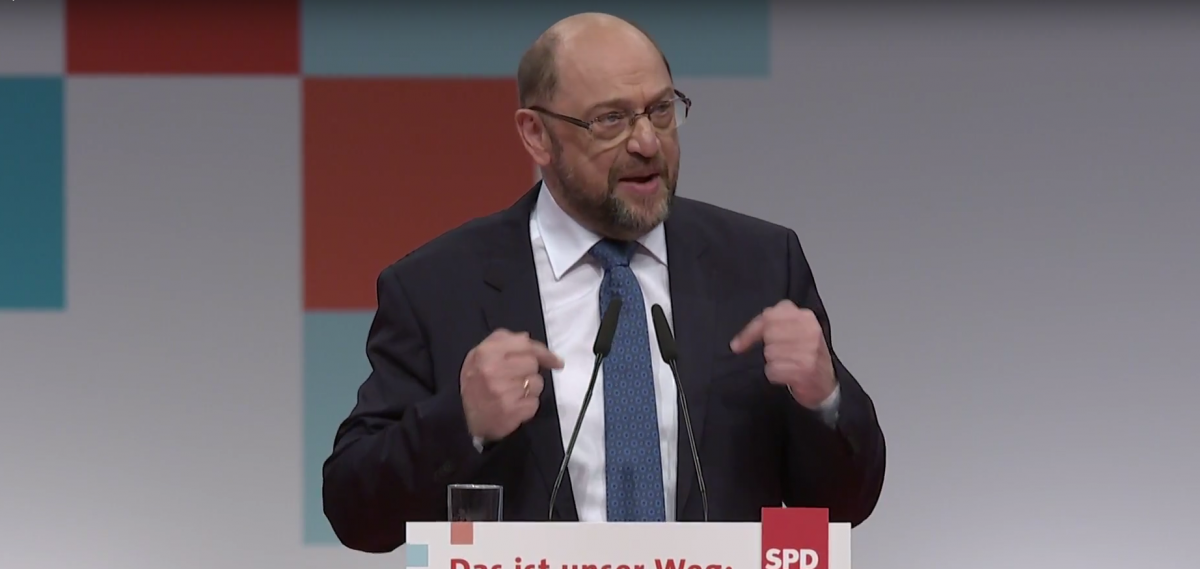SPD leader says Germany must exit coal, but not at expense of workers
SPD party head Martin Schulz said there was no alternative to phasing out coal in Germany.
“The truth is: We want to reach the climate targets. The truth is also: This will go hand in hand with an end to coal-fired power generation,” he said to applause from delegates at a party convention of Germany's Social Democrats.
“But neither at the expense of supply security, nor at the expense of employees. We will need investments worth billions in grids and offerings for the regions.” Schulz did not specify a time frame for the phase-out.
He said the people in Germany’s mining regions were fully aware of the fact that coal mining will have to come to an end. “Denying reality won’t help them. These are very realistic people. The only thing that will help them is a concept for the future.”
The SPD traditionally has close links with the German coal industry and labour unions, due to the party’s focus on workers’ rights. The country’s most important coal mining region, North Rhine-Westphalia (NRW), has for long been a Social Democratic stronghold.
In its election manifesto, the SPD says it wants to preserve the “industrial tradition” of coal regions, but says that this could also be done by generating jobs in renewable energy industries. The party’s parliamentary group indicated that it favoured a “gradual reduction” of coal-fired power production, but it also fell short of naming a possible exit date.
"Coal exit can't be achieved from one day to the next"
SPD energy policy spokesman Bernd Westphal told the Clean Energy Wire ahead of the elections that Germany currently “lacks the conditions” for setting a coal exit date, such as ensuring that energy security is not compromised and a socially acceptable transition for coal workers is guaranteed. However, Westphal recently softened his position, saying that Germany’s last lignite-fired power plant will go off-line by 2040.
Party leader Schulz said it had been possible to close German hard coal mines without creating unemployment, by planning ahead and being able to offer alternative job perspectives. “And now we face a similar situation with brown coal.
“It’s not a task for Social Democracy to conserve the structures of the past. It’s a task for Social Democracy to give a future perspective. This is why we will take care of these perspectives. We will make sure that the transition will be a success," Schulz said
“We know this can’t be achieved from one day to the next, he added. “I want to appeal to you, as the Social Democratic Party, and to all those involved: We have to stop playing off environmental protection against industrial policy. Both will have to go parallel, hand in hand. We have to tackle climate change, and create modern industry.”
Merkel's party agreed to retiring 7 GW of coal power capacity
Schulz and the SPD likely will have to debate the design of a German coal exit with Chancellor Angela Merkel’s conservative CDU/CSU alliance during talks on a renewal of the grand coalition between Germany’s two largest parties. SPD delegates at the convention by a wide margin voted for holding talks with the conservatives after the party head vehemently appealed to them to agree.
Schulz had initially ruled out that such a constellation was an option right after the elections, in which both the SPD and the conservatives suffered heavy losses. But after the collapse of talks on a so-called Jamaica coalition between the conservatives, the pro-business FDP and the environmentalist Green Party, the SPD leader faced mounting pressure.
Germany’s Federal President Frank-Walter Steinmeier as well as other European leaders urged the SPD to seek talks with Merkel’s party in order to end the government gridlock and prevent new elections or a minority government in Europe’s largest economy. Eventually, the SPD leadership reconsidered its stance, saying they felt "obliged" to enter talks on a possible coalition renewal.
During the failed Jamaica talks, the CDU/CSU and the FDP found a compromise with the Green Party on the maximum capacity of coal power that Germany could phase-out in the short run. The parties agreed that retiring 7 gigawatts (GW) of coal capacity could be done without putting supply security at risk.
The move was seen as necessary to bring the country closer to achieving its aim of reducing its greenhouse gas emissions by 40 percent by 2020 compared to 1990 levels. So far, Germany has reduced emissions by less than 30 percent and even is likely to have increasing emissions in 2017. Climate researchers say that decommissioning many of Germany’s most polluting coal plants is the only option to make meaningful progress on the 2020 targets.


